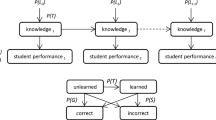Abstract
Adaptive testing is impractical in real world situations where many different learner traits need to be measured in a single test. Recent student modelling approaches have attempted to solve this problem using different course representations along with sound knowledge propagation schemes. This paper shows that these different representations can be merged together and realized in a granularity hierarchy. Bayesian inference can be used to propagate knowledge throughout the hierarchy. This provides information for selecting appropriate test items and maintains a measure of the student's knowledge level.
Preview
Unable to display preview. Download preview PDF.
Similar content being viewed by others
References
C. Conati and K. VanLehn. POLA: a student modeling framework for Probabilistic On-Line Assessment of problem solving performance. In Proceedings of the Fifth International Conference on User Modeling, pages 75–82, 1996. Kailua-Kona, Hawaii.
C. E. Dowling and R. Kaluscha. Prerequisite relationships for the adaptive assessment of knowledge. In Proceedings of the Conference on Artificial Intelligence in Education, pages 43–58, 1995. Washington, D.C.
J. Martin and K. VanLehn. A Bayesian approach to cognitive assessment. In P. Nichols, S. Chipman, and R. L. Brennan, editors, Cognitively Diagnostic Assessment, pages 141–165. LEA, Hillsdale, NJ., 1995.
G. I. McCalla and J. E. Greer. Granularity-based reasoning and belief revision in student models. In J. E. Greer and G. I. McCalla, editors, Student Modelling: The Key to Individualized Knowledge-Based Instruction, pages 39–62. Springer-Verlag, Berlin, 1994.
R. Shachter, B. D'Ambrosio, and B. DelFavero. Symbolic probabilistic inference in belief networks. In Proceedings Eighth National Conference on AI, pages 126–131. AAAI, August 1990.
J.-A. Sime. Modelling a learner's multiple models with Bayesian belief networks. In Proceedings of the Conference on Artificial Intelligence in Education, pages 426–432, 1993. Edinburgh, Scotland.
M. Villano. Probabilistic student models: Bayesian belief networks and knowledge space theory. In Proceedings of the Second International Conference on Intelligent Tutoring Systems, pages 491–498, 1992. Montréal, Canada.
D. Weiss and G. Kingsbury. Application of computerized adaptive testing to educational problems. Journal of Educational Measurement, 12:361–375, 1984.
R. E. Welch and T. W. Frick. Computerized adaptive testing in instructional settings. Educational Technology Research and Development, 41(3):47–62, 1993.
Author information
Authors and Affiliations
Editor information
Rights and permissions
Copyright information
© 1996 Springer-Verlag Berlin Heidelberg
About this paper
Cite this paper
Collins, J.A., Greer, J.E., Huang, S.X. (1996). Adaptive assessment using granularity hierarchies and bayesian nets. In: Frasson, C., Gauthier, G., Lesgold, A. (eds) Intelligent Tutoring Systems. ITS 1996. Lecture Notes in Computer Science, vol 1086. Springer, Berlin, Heidelberg. https://doi.org/10.1007/3-540-61327-7_156
Download citation
DOI: https://doi.org/10.1007/3-540-61327-7_156
Published:
Publisher Name: Springer, Berlin, Heidelberg
Print ISBN: 978-3-540-61327-5
Online ISBN: 978-3-540-68460-2
eBook Packages: Springer Book Archive




